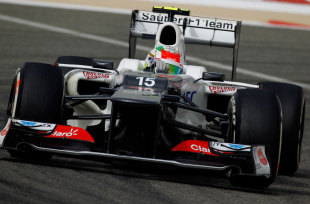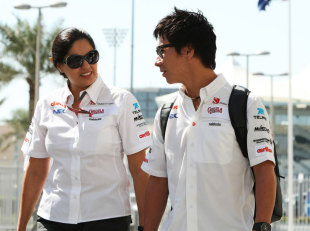- GP Week
Swiss watch

- Teams:
- Alfa Romeo
Hands up those among you who - back in February, when the C31 was looking fast-ish but unreliable in winter testing - thought that Sauber would be one of the teams we were all talking about heading into the European leg of the season? No one? Us neither.
On the first day of winter testing, Sauber greeted the media in Jerez with the news that they had been through a mutual 'parting of ways' with technical director James Key, and that they were not actively seeking to replace him.
Given that Sauber had shown promise in the early part of the 2011 season, only to fall behind their competitors as the development race continued, the announcement was seen as bad news for the team. Without a technical director, the assumption was that Sauber would lose technical direction.
Key's departure does not appear to have had a negative impact, given the Swiss racers' recent performances on track, but the real test will come as the rate of development ramps up, when Sauber have to keep improving, ideally at a faster rate than their rivals.
But team CEO Monisha Kaltenborn is confident that the lack of a technical director will not hamper Sauber's progress this season. Asked about the team's development programme in light of Key's departure, Kaltenborn said it had been unaffected.
"We had a [development] programme laid out, and there's not much of a difference implementing that programme, because the people who were important to its implementation are the same people: we have the head of aero, the head of design, and the head of vehicle performance," she explained. "Together with the operations director, who is in charge of the production of the car, they were the key players anyway. So in implementing the programme we have set out, there is no difference."
Kaltenborn was restrained in her comments on the team's expectations, and she is aware that while early results can bring in a useful points harvest, it is consistency in the on-going development race that is vital - and expensive.
"Generally, we said at the beginning of the season that we had high targets, because we wanted to significantly improve in the championship," Kaltenborn said. "And for a team like ours - this is valid for most of the private teams here - if you have more money, you can develop more. And that, again, means hopefully better performance, and then you get closer to your target. So from that perspective we cannot be happy with our budget, because we always want to develop more."
Pirelli motorsport director Paul Hembery is also careful to point out that Sauber's early gains could be negated by slow progress in the ongoing development race.
"The rate of development is very high," he said. "So the teams that have bigger budgets, at the end of the day, can pull through and pull away during the season. But that takes a bit of time, and clearly Sauber have a car that's certainly podium material at the moment, and that's a fantastic achievement when you look at their resources compared to some of the bigger teams."

"With all of this [positive attention] we shouldn't forget that the gap between the teams is so small - we saw that at the last race [in Shanghai]," Kaltenborn said. "You have to be so careful to get everything right, which doesn't happen always. That's why you have to stay extremely focused on your own development plan, really make sure that you meet your targets."
And in such a tight field, every millisecond counts.
"What's happening this year is that that [2011's] Q2 group has now become a Q3 group, so the performance between 16 or 17 cars is so close together," Hembery explained. "What that means is that tyre management becomes really, really seriously important, because tenths count at that point. I think you'll find that the teams that manage their tyres extremely well during this period where the teams are so close together will get results."
So what has given Sauber the edge in such a competitive field? The C31's light touch on tyres has certainly helped, while Sergio Perez' supernatural ability to one-stop at seemingly every circuit has also given the team an advantage on track. According to Kaltenborn, Sauber's secret is the combination of a well balanced car and two young, hungry, and talented racers behind the wheel. But despite early success, the Swiss team is too prudent to waste time resting on its laurels.
"Last year, we certainly had a lot of issues with warming up the tyres, so with this year's car it was one of the targets that we overcome those difficulties, which I think the team has done very well," she said. "But we should always be careful that these are just the first few races. People who have seen now that they are having issues with the tyres are going to put a lot of effort into overcoming that issue.
"I think it's too early to say we have the right car for all the races, because people will not stop their development," Kaltenborn continued. "We will not stop our development. Up to now, we can see that the car has done well on very different tracks, under very different ambient conditions. But we know that our competitors are catching up, are already very close, so we should not rely on this kind of advantage."
Hembery says that Sauber's successes so far are about more than just good tyre management. Rather, the Sauber's aero balance is the secret, as a well-balanced car generates less wear and tear on the tyres.
"The car, clearly, is well designed and well-balanced for the tyres," Hembery said when GPWEEK interviewed him in Shanghai. "Last year, that enabled them to do one pitstop less than the other teams during the season. It seems that this year, they've got the speed as well. So if they can combine the two, it's a pretty potent combination.
"The drivers are young and hungry, they clearly have some good equipment to work with at the moment, and you can see from the results of qualifying here in Shanghai that they're a force to be reckoned with. They've already shown in two races and now in qualifying in Shanghai that [their pace] is not a joke, that it's real. I think the paddock's really excited."
The cause of that pace, Hembery says, is linked to their aero balance, which enables both Saubers to maximise their tyres.
"In Formula One, a lot of things come from aero balance; the aero's so important," he emphasised. "They have a very good aero balance, the car has a very good natural balance.
"What we mean by that is that it's not overtly understeer balanced and not overtly oversteer balanced. It has a good balance, which allows the drivers to maximise the performance of the package over a long period of time.
"In Formula One, one of the big challenges for any team is trying to find speed in fuel load, so with 140kg on board, and then in qualifying when they're lighter fuelled. That's very difficult to find [a balance] because it's quite easy to focus on one or the other, but trying to get both together is very difficult. Sauber have been very good at managing that, particularly from a tyre point of view."
The 2012 F1 season had hardly begun when we met with Hembery in Shanghai, but the Pirelli motorsport director was confident the strong performances we'd seen in Melbourne and Sepang were hardly a flash in the pan.
"It's clearly no fluke, because this is now the second season in a row we've seen the same result," he said. "They've got a good idea of how to maximise the Pirelli tyres, and this year they've clearly got some speed as well. Long may it continue for them."

